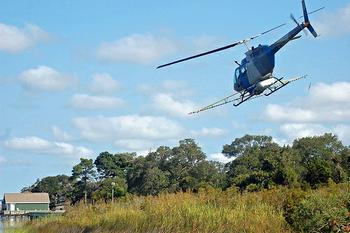EPA Requires Permit for Pesticide Application to U.S. Waters
WASHINGTON, DC, June 2, 2010 (ENS) – The U.S. Environmental Protection Agency is proposing a new permit requirement that would decrease the amount of pesticides discharged to U.S. federal waters.
The action is in response to an April 9, 2009 appeals court decision that found that pesticide discharges to U.S. waters are pollutants, and so they require a permit under the Clean Water Act.
The new Pesticides General Permit was developed in response to a decision by the Sixth Circuit Court of Appeals in the case National Cotton Council of America v. EPA.
The court vacated the Bush-era EPA’s 2006 rule that said National Pollution Discharge Elimination System permits under the Clean Water Act were not required for applications of pesticides to U.S. waters.
Two different groups of petitioners – environmental interest groups and industry interest groups – opposed the EPA’s Final Rule as exceeding the EPA’s interpretive authority.
Before the court, EPA lawyers defended the Final Rule by arguing that the terms of the Clean Water Act are “ambiguous” and that the Final Rule is a “reasonable construction” of the Clean Water Act entitled to deference from this Court.
 |
A helicopter sprays pesticide to control the invasive plant, phragmites, in Virginia’s False Cape State Park. (Photo courtesy of the Virginia Department of Conservation and Recreation) |
In its ruling, the court stated, “We cannot agree. The Clean Water Act is not ambiguous. Further, it is a fundamental precept of this Court that we interpret unambiguous expressions of Congressional will as written.”
On February 22, 2010 the U.S. Supreme Court declined industry’s request to review the Sixth Circuit’s decision in the National Cotton Council, v. EPA case.
The proposed permit, which the EPA released today for public comment was developed in collaboration with states. It would require all operators to reduce pesticide discharges by using the lowest effective amount of pesticide, prevent leaks and spills, calibrate equipment and monitor for and report adverse incidents.
Additional controls, such as integrated pest management practices, are built into the permit for operators who exceed an annual treatment area threshold.
“EPA believes this draft permit strikes a balance between using pesticides to control pests and protecting human health and water quality,” said Peter Silva, assistant administrator for EPA’s Office of Water.
EPA estimates that the pesticide general permit requirement will affect approximately 365,000 pesticide applicators who perform 5.6 million pesticide applications annually.
The agency’s draft permit covers mosquito and other flying insect pest control; aquatic weed and algae control; aquatic nuisance animal control; and forest canopy pest control.
It does not cover terrestrial applications to control pests on agricultural crops or forest floors.
EPA is soliciting public comment on whether additional use patterns should be covered by this general permit.
The agency plans to finalize the permit in December 2010 and it will take effect April 9, 2011.
Once finalized, the pesticide general permit will be used in states, territories, tribal lands, and federal facilities where EPA is the authorized permitting authority.
In the 44 states that conduct their own pesticide permitting as authorized by the EPA, states will issue the pesticide general permits.
The EPA has been working with these states to concurrently develop their permits.
During the comment period EPA will hold three public meetings, a public hearing, and a webcast on the Pesticides General Permit. At the meetings, anyone may provide written or oral statements and data pertaining to the draft permit.
Public meetings will be held in:
- Albuquerque, New Mexico: Public meeting on Monday, June 14, from 12:00 pm to 3:00 pm, at the CNM Workforce Training Center, Room 101, 5600 Eagle Rock Avenue, N.E., Albuquerque
- Boise, Idaho: Public meeting on Wednesday, June 16, from 12:00 pm to 3:00 pm, at the Bureau of Reclamation, rooms 206 & 219, 1150 North Curtis Road, Boise
- Boston, Massachusetts: Public meeting on Monday, June 21, from 1:00 pm to 4:00 pm, at EPA Region 1, 5 Post Office Square, Suite 100, Conference Room 1529, Boston
A public hearing will be held in Washington, DC on Wednesday, June 23, from 10:00 am to 1:00 pm, at the EPA East Building, Room 1531, 1301 Constitution Avenue, NW, Washington, D.C.
To present a statement at the public hearing, please contact Virginia Garelick at 202-564-2316 to register. Speakers will be given up to three minutes, or as time allows, to provide their comments on a first come first served basis. Any additional comments must be provided in writing. EPA will consider all comments received and will include copiesof them in the Administrative Record.
EPA has scheduled a webcast to provide information on this draft permit and to answer questions for interested parties that are unable to attend the public meetings or hearing. The webcast will be broadcast on June 17 from 1:00 pm to 3:00 pm Eastern Standard Time.
EPA will accept written comments on the draft permit for 45 days after publication in the Federal Register. More information on the draft permit: http://www.epa.gov/npdes
Copyright Environment News Service (ENS) 2010. All rights reserved.
